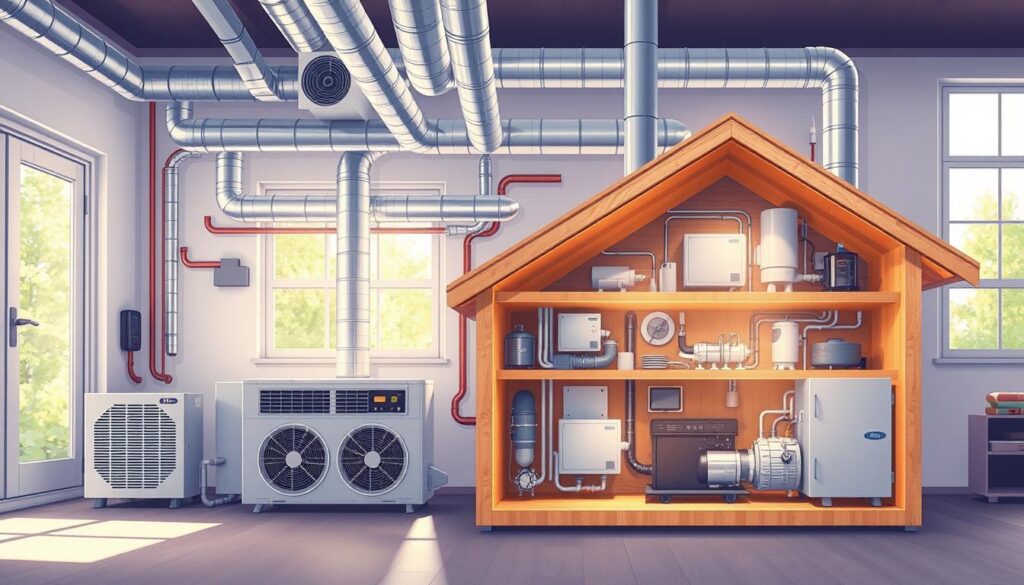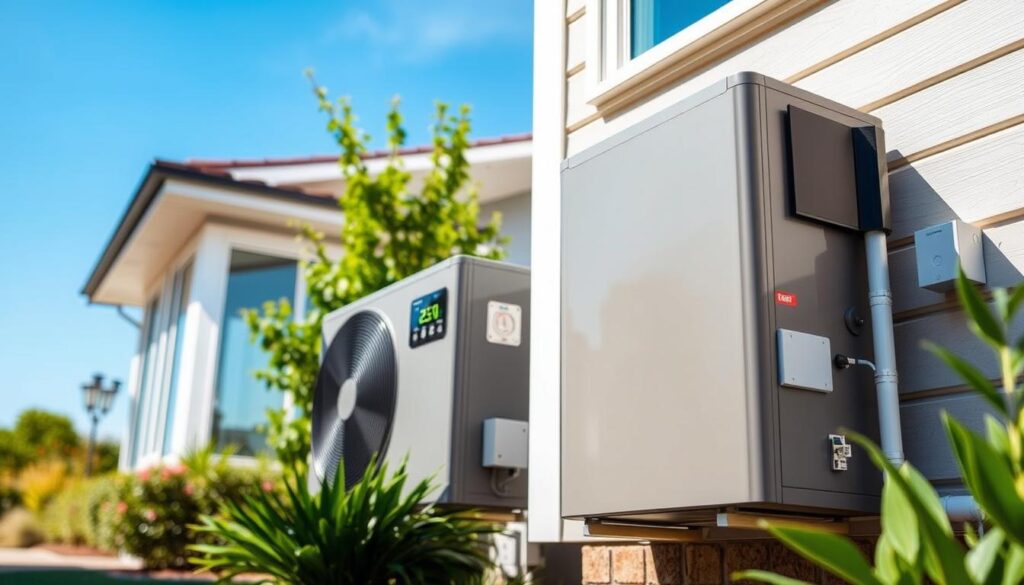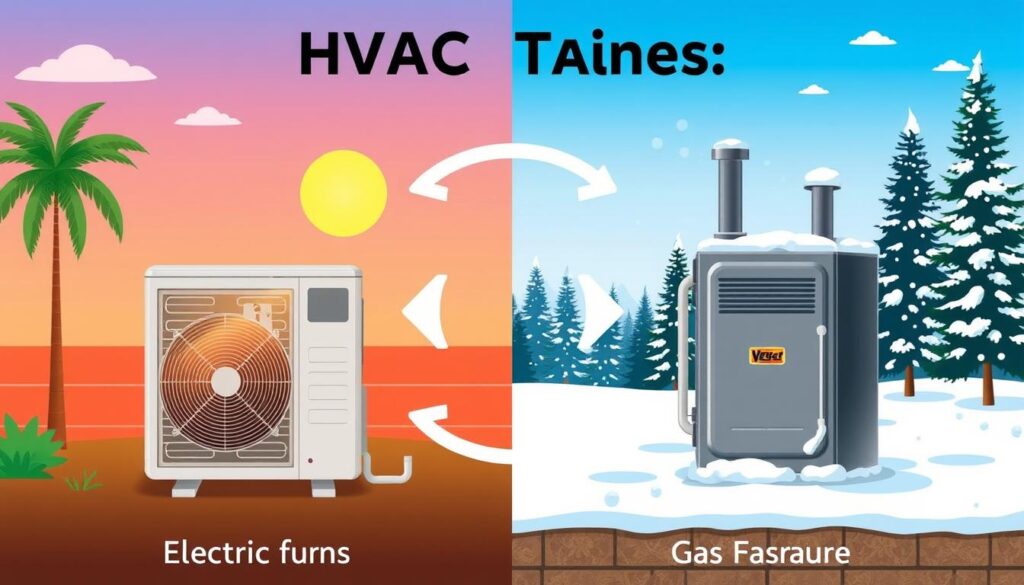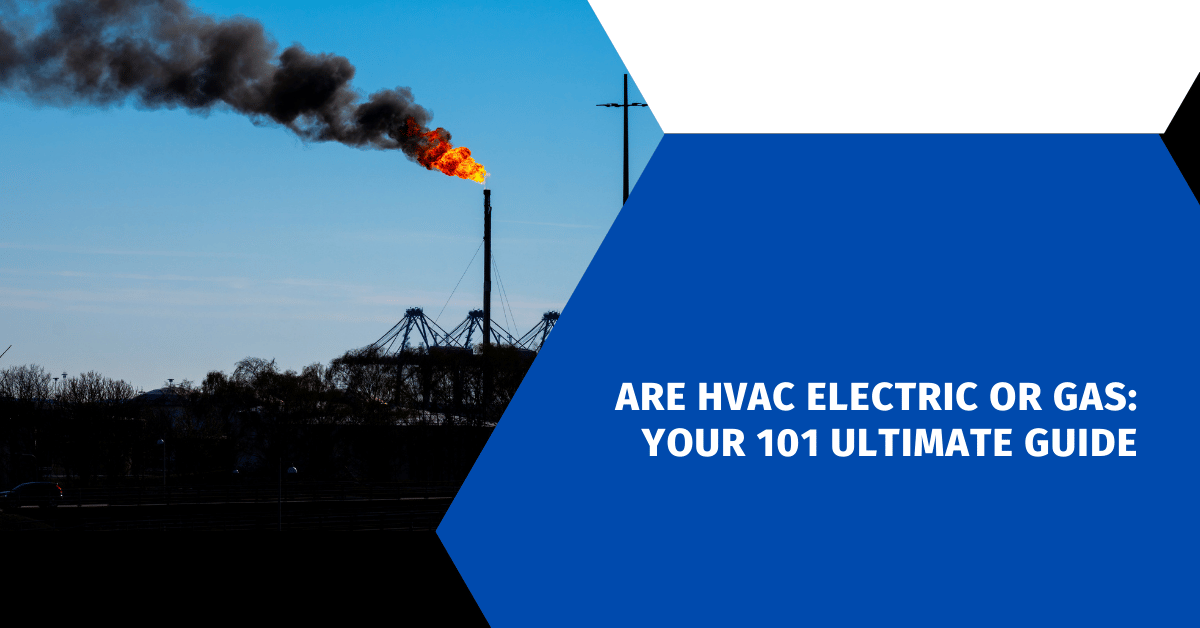Affiliate Disclosure
HVAC Guide Guys is a participant in the Amazon Services LLC Associates Program, an affiliate advertising program designed to provide a means for sites to earn advertising fees by advertising and linking to Amazon.
Are HVAC Electric or Gas? HVAC systems are vital in today’s homes. They keep our indoor climate comfortable and air clean all year. But, have you thought about whether they run on electricity or gas?
This guide will explore HVAC systems in detail. We’ll look at their parts, how they work, and the electric vs. gas debate. By the end, you’ll know how to choose the best system for your home.

Key Takeaways
- HVAC systems are essential for maintaining comfortable indoor temperatures and air quality throughout the year.
- HVAC systems can be powered by electricity, gas, or a combination of both, with each option offering unique benefits and trade-offs.
- The choice between electric and gas HVAC systems depends on factors such as climate, energy costs, and environmental concerns.
- Understanding the components, functions, and types of HVAC systems is crucial for making an informed decision for your home.
- Maintenance and energy efficiency are key considerations when selecting an HVAC system.
Table of Contents
Understanding HVAC Systems: Basic Components and Functions
To understand your HVAC system, you need to know its main parts. These systems have several key elements. Each plays a crucial role in keeping your home comfortable.
Key Components of Modern HVAC Systems
The main parts of an HVAC system are:
- Air Conditioners – They cool and dehumidify the air by removing heat and moisture.
- Furnaces – These use gas, oil, or electricity to warm your home in the cold months.
- Air Handlers – They move air around your home, working with the air conditioner or furnace.
- Heat Pumps – They can heat and cool your home by moving heat in or out.
- Refrigerant – This fluid helps in cooling and heating by absorbing and releasing heat.
- Ductwork – It’s a network of air channels that spread conditioned air to all rooms.
How HVAC Systems Work Together
The components of an HVAC system work together to keep your home comfortable. The air conditioner cools and dehumidifies the air. The furnace warms the air.
The air handler moves the conditioned air through the ductwork. This ensures the air is evenly distributed. Heat pumps can heat or cool by moving heat. The refrigerant is key in this process. The ductwork delivers the conditioned air efficiently.
The Role of Thermostats and Controls
The thermostat is at the center of the HVAC system. It lets you control the temperature and system operation. Modern thermostats have features like scheduling, zoning, and remote access.
These features help you manage your home’s climate. They ensure comfort and save energy.
Explore Our HVAC Shop
Looking for top-rated HVAC tools, parts, and accessories? Visit our shop and find the perfect solution for your needs.
Visit the ShopAre HVAC Electric or Gas: Breaking Down Your Options
Homeowners can choose between electric, gas, or hybrid HVAC systems. Knowing the good and bad of each can guide your decision.
Most HVAC systems use electricity for cooling. Some use gas for heating. A mix of both, like a heat pump with a gas furnace, is used in very cold weather or when there’s no power.
In bigger homes, electric cooling and gas heating are common. But, systems with separate units for heating and cooling can cost more to run.
| Feature | Electric HVAC | Gas HVAC |
|---|---|---|
| Installation Cost | $500 – $1,500 | $1,795 – $6,290 |
| Lifespan | Up to 30 years | Around 20 years |
| Monthly Operating Cost | Cheaper | More expensive |
| Heating Speed | Slower | Faster |
| Suitable Climates | Mild | Colder |
| Maintenance | Less complex | More frequent and complex |
| Safety | No CO poisoning risk | Risk of CO poisoning |
| Energy Efficiency | Less efficient for heating | More efficient for heating |
The choice between electric and gas HVAC systems depends on local energy costs, climate, and environmental concerns. Each has its own benefits and drawbacks in terms of performance, efficiency, and cost.
For the best choice for your home, talk to a professional HVAC contractor like Green Energy Mechanical, Inc.. They can give you advice tailored to your needs and preferences.
Explore Our HVAC Shop
Looking for top-rated HVAC tools, parts, and accessories? Visit our shop and find the perfect solution for your needs.
Visit the ShopGas-Powered HVAC Systems: Benefits and Drawbacks
Gas-powered HVAC systems, like natural gas furnaces, have many benefits. They heat up fast and work well in cold weather. This makes them a top choice for homes in areas with very cold winters.
Efficiency and Performance in Cold Weather
Gas furnaces are great in cold places because they heat up quickly and evenly. They burn air and fuel to warm the air. This makes them perfect for places with very cold winters.
Cost Considerations for Gas Systems
Another plus of gas-powered HVAC systems is they can save money in areas where natural gas is cheap. Natural gas is often less expensive than electricity, which means lower bills over time. But, the initial cost to set up a gas system is higher than electric ones.
Installation Requirements
One big drawback of gas-powered HVAC systems is the complex installation. They need special ventilation, gas lines, and other parts for safe and efficient use. This makes installation more expensive and complicated than electric systems. Homeowners should think about natural gas availability and installation costs when choosing a gas system.
Gas-powered HVAC systems heat up fast, work well in cold, and might save money. But, they cost more to install and have a bigger environmental impact. It’s important to weigh these points when deciding between gas and electric for your home.
“In Houston, where summers are famously hot and humid and winters surprisingly chilly, a reliable HVAC system is a year-round necessity due to extreme weather conditions.”
Electric HVAC Systems: Advantages and Limitations
Homeowners are now looking for ways to save energy and protect the environment. Electric heat pumps are becoming a top choice. They are very energy efficient and can heat and cool homes without much pollution. They are also easier to install than traditional gas systems, making them popular in all-electric homes.
Electric heat pumps work best in mild weather. They move heat around instead of making it, saving money on bills. But, they might not work well in very cold weather.
Getting an electric HVAC system might cost more upfront than gas systems. But, it can save money over time. This makes electric systems a good choice for those who want to cut down on carbon emissions and save energy.

But, electric HVAC systems have some downsides. If electricity is expensive in your area, they might cost more to run. Also, if there’s a power outage, they won’t work, leaving you without heat or air until power returns.
Still, electric HVAC systems, especially heat pumps, are a great option for those who want to save energy and help the planet. They might not be perfect in extreme weather, but they’re good for most climates. They’re easy to install and can save money in the long run, making them a smart choice for many homes.
Explore Our HVAC Shop
Looking for top-rated HVAC tools, parts, and accessories? Visit our shop and find the perfect solution for your needs.
Visit the ShopHybrid HVAC Systems: The Best of Both Worlds
Looking for an HVAC solution that combines electric and gas systems? A hybrid HVAC system might be what you need. It’s also known as a dual-fuel system. It pairs an electric heat pump with a gas furnace, offering the best of both worlds.
Dual Fuel Technology Explained
A hybrid HVAC system switches between electric heat pump and gas furnace based on temperature and energy costs. In moderate weather, the heat pump handles heating and cooling. When it gets colder, the system uses the gas furnace for more heat.
Energy Efficiency Features
Hybrid HVAC systems focus on saving energy. Heat pumps can cut electricity use for heating by up to 50% compared to traditional furnaces, says the Department of Energy. With a high-efficiency gas furnace, these systems can save a lot on energy bills.
Climate-Specific Benefits
Hybrid HVAC systems work well in areas with changing seasons. They adjust the fuel source for optimal comfort and efficiency all year. In dry, hot winters, the heat pump provides better comfort than a gas furnace alone.
Choosing a hybrid HVAC system is a smart move. It combines electric and gas technologies for energy-efficient heating and cooling. It adapts to your climate’s needs, making it a great hybrid heating option.
“A hybrid HVAC system, pairing a heat pump with a gas furnace, can save 30-50% of total heating and cooling costs.”
Environmental Impact and Energy Efficiency Comparison
HVAC systems have different impacts on the environment and energy use. Gas furnaces release greenhouse gases, increasing the carbon footprint. In contrast, electric systems, especially those using renewable energy, have a lower environmental impact.
Heat pumps are seen as eco-friendly HVAC options because they are efficient and don’t emit on-site pollutants. ENERGY STAR certified systems meet strict energy standards set by the U.S. Environmental Protection Agency. This makes them a better choice for homeowners looking to be more sustainable.
When looking at HVAC systems’ environmental impact, it’s key to think about direct emissions and local electricity sources. Energy efficiency ratings, like SEER for cooling and AFUE for heating, help you choose the most energy-efficient system for your home.
| Metric | Gas Furnaces | Electric Furnaces |
|---|---|---|
| Carbon Footprint | Higher due to greenhouse gas emissions | Lower, especially with renewable energy sources |
| ENERGY STAR Certification | Available for high-efficiency models | Available for high-efficiency models |
| Efficiency Rating (AFUE) | Up to 98.5% | Near 100% |
| Environmental Impact | Higher due to direct emissions | Lower, particularly with renewable energy |
Understanding the environmental and energy efficiency of HVAC systems helps you make a better choice. This choice can reflect your personal and environmental values.
Cost Analysis: Installation, Operation, and Maintenance
Thinking about HVAC systems means looking at more than just the price tag. Homeowners need to think about the costs of installation, energy bills, and maintenance over time. Knowing these costs helps you choose the right HVAC system for your home and budget.
Initial Investment Considerations
The cost of an HVAC system can vary a lot. Electric furnaces are often cheaper to buy than gas furnaces. But, gas furnaces might save money in the long run because they cost less to run. Hybrid systems, which mix electric heat pumps and gas furnaces, cost more upfront but could save money by being more efficient.
Long-term Operating Costs
Energy bills play a big role in the total cost of an HVAC system. Gas-powered systems usually cost less to run, especially where natural gas is cheap. Electric heat pumps can be cheaper in places with mild weather because they use less energy. Think about your local energy prices and weather when comparing HVAC costs.
Maintenance Requirements and Expenses
Keeping your HVAC system in good shape is key. Gas furnaces need more upkeep than electric systems, which can lead to higher maintenance costs over time. The age of your system, how much you use it, and local service rates also affect maintenance costs.
When looking at HVAC options, think about the HVAC installation costs, energy bills, and system maintenance needs. By looking at these factors, you can choose the best HVAC system for your home and budget.
Explore Our HVAC Shop
Looking for top-rated HVAC tools, parts, and accessories? Visit our shop and find the perfect solution for your needs.
Visit the ShopMaking the Right Choice for Your Climate Zone
Choosing the right HVAC system for your home depends on your climate zone. In cold areas, gas-powered furnaces or hybrid systems work best. They heat your home quickly and keep it warm.
In places with mild winters and hot summers, electric heat pumps are great. They cool well in summer and heat when it’s cold. They also remove excess moisture, which is good for coastal areas.
Think about your area’s temperature, humidity, and how long you heat and cool. Also, look at local energy prices and if natural gas is available. These things help find the best and most cost-effective HVAC for you.
| Climate Zone | Recommended HVAC System | Key Considerations |
|---|---|---|
| Cold Regions | Gas Furnaces or Hybrid Systems | – Superior heating capabilities – Consistent indoor temperatures – Reliable operation in harsh winters |
| Mild Climates | Electric Heat Pumps | – Efficient cooling and adequate heating – Enhanced dehumidification for coastal areas – Potential for lower operating costs |
Talking to a skilled HVAC expert is wise. They can guide you to the best system for your climate. This ensures you get the best climate-specific HVAC, regional energy efficiency, and seasonal performance.

Conclusion
Choosing the right HVAC system is key for your home’s comfort and savings. Think about your local weather, energy costs, and what you prefer for home comfort and energy-efficient heating and cooling.
Gas-powered systems heat well in cold areas but can harm the environment. Electric systems cool and heat efficiently, but their impact depends on the electricity source. Hybrid systems mix gas and electric for flexibility and efficiency.
The best system for your home depends on your needs, budget, and goals. Talk to HVAC experts to find the perfect fit for you. Remember, proper care is vital for your system’s performance and life, whether it’s electric or gas.

